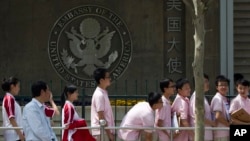Student Union
Scholarships Help Refugees Finance Higher Education
Nevfel Akkasoglu was arrested and imprisoned for 14 months during the attempted Turkish military coup d’état in 2016 for being associated with a university the Turkish government had shut down.
Akkasoglu eventually made his way to New York’s Columbia University, where a new scholarship allows him to live and study without fear or worry over how to finance his education.
“This is really important for me to pursue my dreams in returning to my original profession, as being a lawyer, in the United States. I believe it would be really hard to pursue a master’s degree without that scholarship,” said Akkasoglu, a candidate for a Master of Laws (LL.M) degree in data privacy and cybersecurity at Columbia Law School.
Akkasoglu and his wife have asylum in the U.S.
“Being approved told me that our story, the things that I experienced in Turkey, the grave situations, really mattered. It told me that there is still hope, there is still hope in life. You should continue to pursue your dreams no matter what, and you should never give up,” said Akkasoglu.
His scholarship at Columbia is new and unusual. The Ivy League school offers full scholarships every year for refugees and other displaced students.
The Columbia University Scholarship for Displaced Students (CUSDS) was launched in December 2019. It is the first-ever Columbia-wide scholarship and the world’s first of its kind, according to the school’s website.
“I’m very grateful that I got the scholarship,” said Shabnam Fayyaz, a CUSDS recipient. Born in Afghanistan in 1996, the year the Taliban came to power, Fayyaz and her family fled first to Pakistan.
“I’m learning a lot. For every reading, I’m like, ‘Woah, this is what I really want to do.’ It’s like a dream that I’m fulfilling through this scholarship that I have and through this master’s human rights studies that I’m doing at Columbia,” said Fayyaz.
“Having this scholarship and doing this master’s, I’m discovering that I’m very interested in doing a PhD in human rights or going to law school to help immigrants and refugees in the future, especially women, coming from countries like Afghanistan and Pakistan,” she added.
Fayyaz is pursuing her master’s degree in human rights with a focus on refugee rights and women’s rights. She applied for asylum in 2019, and her case is pending.
Administered by the Columbia Global Centers, which are research outposts established by the university in nine international locations, CUSDS commits up to $6 million in scholarship money for up to 30 students.
The scholarship covers the students’ tuition, housing and living assistance while they pursue undergraduate or graduate degrees across all 18 of Columbia’s schools and affiliates.
Recipients will also reap mentoring benefits from the schools and student groups.
“[This scholarship] means hope. And despite all the challenges we have currently in the world, we can still make a change when you provide skilled people, who have the potential to change the world, then we are still in a good place,” said Sami Salloum, originally from Damascus, Syria, and a CUSDS recipient.
Salloum is a master’s student focusing on negotiation and conflict resolution. Before attending Columbia, Salloum interned with the United Nations Security Council. His case seeking asylum is pending.
“If other universities follow the pioneering experience that Columbia has launched, we’ll be in a good place where millions of children and youth who have been deprived from their education can join and prove themselves, and improve the circumstances of their communities,” Salloum added.
As of 2019, the United Nations Refugee Agency (UNHCR) reported that there were nearly 80 million displaced people around the world as a result of persecution, conflict, violence or human rights violations.
Columbia University is accepting applications for its second class of CUSDS recipients. Those seeking to apply must be foreign nationals with refugee status or who have received U.S. asylum, submitted an asylum application, be in the U.S. under Temporary Protected Status, or be classified as internally displaced persons. Those who are eligible may apply from anywhere in the world. There are no age restrictions and students are accepted on a rolling basis.
Applicants must apply to and be accepted by one of the degree programs listed on the website to be eligible for the CUSDS. Acceptance requirements and application deadlines differ depending on the school and degree program.
For the 2020-21 academic year, 18 students from 13 countries were selected from a competitive pool of more than 1,200 applicants.
“These students have been through traumatic experiences and they are determined to not let that stand in the way of them being able to pursue their dreams,” said Safwan Masri, the executive vice president for Columbia’s Global Centers and Global Development.
He added, “For us, at Columbia, to be able to provide them that opportunity that they otherwise would not have had, to get a full ride and pursue their studies, feels incredibly powerful.”
See all News Updates of the Day
- By VOA News
International students discuss US campus culture shock

International students at De Anza College in Cupertino, California, talked about culture shock in an article in La Voz News, the student newspaper.
"It felt like a major culture shock. Everything was so different, from academics to mannerism," said a student from Mexico.
Read the full story here.
These are the most expensive schools in the US
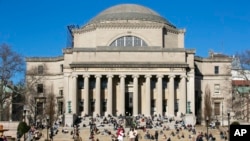
High tuition costs along with housing and food expenses can add up for students at U.S. colleges and universities.
MSNBC looked at the most expensive schools in the country, with one costing more than $500,000 for a bachelor’s degree. (June 2024)
Uzbekistan students admitted into top US universities
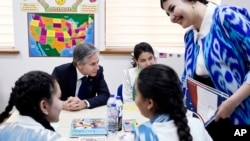
Students from Uzbekistan are among the international students admitted to top colleges and universities in recent years.
Gazata.uz profiled some of the Uzbekistan students attending Harvard, Brown, Princeton and other U.S. universities. (June 2024)
- By Stella Hsu
Reports of visa checks, deportations worry Chinese STEM students in US
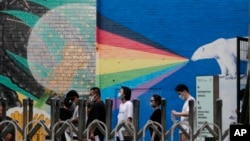
Geopolitical tensions and growing competition in tech between the United States and China appear to be spilling over into academia despite commitments from the world’s two biggest economies to boost people-to-people exchanges.
The United States remains the top choice for Chinese students seeking to study abroad with nearly 300,000 studying in American colleges and universities during the 2022-2023 school year. But reports of some cases that students and professors are facing extra scrutiny while passing through immigration and the deportation of others are raising concerns.
For Chen Xiaojin, a doctoral student studying semiconductor materials at a university in the Washington, D.C., metropolitan area, it has been six years since she returned to her hometown of Beijing.
At first, it was the COVID-19 pandemic that kept her from going home. But over the past two years, she has been deterred by accounts of Chinese students majoring in science and engineering being required to reapply for their visas upon returning to China.
She also says she is worried by reports over the past six months of Chinese students being deported, even at nearby Dulles Airport.
"My current research is relatively sensitive, and my boss [adviser] is getting funds from the U.S. Department of Defense, making it even more sensitive,” she told VOA. "I am afraid that I won't be able to return after I go back [to China]."
Chen says that if she did return to China, she would have to apply for a new visa.
In a report late last month, Bloomberg said it had found at least 20 Chinese students and scholars with valid visas who were deported at U.S. Customs since November and barred from reentry. The U.S. Customs and Border Protection Agency does not release relevant data.
Immigration attorney Dan Berger represented one Chinese student who was deported late last year. He tells VOA Mandarin that the student studied biological sciences at Yale University and was about to complete her doctorate.
She visited her family in China and got a new visa but was deported by customs at Dulles Airport and barred from reentering the country for five years. Berger said he did not see anything suspicious in the transcript of the conversation between the student and the customs officer.
"We have seen what seems like a pattern over the last six months of Chinese PhD students being turned around…. more than I've seen in quite a while," he said.
Matthew Brazil, a fellow at the Jamestown Foundation, said neither country seems willing to explain the situation. However, he believes that in most cases, the United States must have valid reasons for blocking visa holders from entering the country.
In some cases, the student’s background may not match what is written on the visa application. In other cases, customs agents may also find something that the State Department missed, and once they see it, they are responsible for taking action.
"I wish the Chinese side would be specific about their students who were refused entry,” he said. “The fact that both sides are mum on details and that the Chinese side is engaged with the usual angry rhetoric means that each has security concerns. And that says to me that there was good reason for the U.S. to stop these particular applicants."
Brazil also sees a connection between the entry denials and export control regulations issued by the United States in October 2022 that restrict China's ability to obtain advanced computing chips, develop and maintain supercomputers, and manufacture advanced semiconductors.
U.S. Customs and Border Protection is one of the law enforcement agencies authorized to investigate violations of export control regulations, he said.
"Beijing's intelligence agencies are known to focus attention on PRC [People's Republic of China] students and scientists headed abroad who study or work on dual-use technologies controlled under the Export Administration Act — compelling Chinese students and scientists to report on what they've learned when they return to China on holiday,” he said. “This has been true for decades."
Bill Drexel, a fellow for the Technology and National Security Program at the Center for a New American Security, said the U.S. government did find some cases where students tried to steal strategic technology for China.
"I think it would both not be surprising that they found some really questionable or incriminating evidence for some students,” he said. “It would also not be surprising if, in their hunt for really solid evidence, they also may have made some mistakes on other students.”
Drexel adds that “it’s just kind of an unfortunate fact of the time that we live in and the tactics that the CCP uses when it comes to these measures."
In a post on X in early May, U.S. ambassador to China Nicholas Burns tried to dispel concerns about visas and entry to the United States for students and scholars. In the post, he said "99.9% of Chinese students holding visas encounter no issues upon entering the United States.”
In an interview with The Wall Street Journal Monday, Burns said it is China that is making it impossible to promote people-to-people ties. Burns told the Journal that students attending events sponsored by the United States in China have been interrogated and intimidated.
He also said that since U.S. President Joe Biden and China’s leader Xi Jinping held their summit in San Francisco last year, China’s Ministry of State Security and other agencies had interfered with Chinese citizens’ participation at some 61 events.
At a regular briefing on Wednesday, Chinese Foreign Ministry spokesperson Mao Ning dismissed those accusations, saying that they did not “reflect reality" and that went against key understandings reached by both countries’ presidents in San Francisco.
“The United States, under the pretext of 'national security,' unjustifiably harasses, interrogates, and deports Chinese students in the U.S., causing them significant harm and creating a severe chilling effect,” Mao said. “The image of the United States in the minds of the Chinese people fundamentally depends on the actions of the United States itself.”
Drexel said he believes Burns’ comments about visas and students' willingness to study in the U.S. still ring true.
“On balance, it's still the case that American universities are overwhelmingly warm towards Chinese students and want them in large numbers," he said.
However, Berger, the immigration lawyer, is concerned about the chilling effect recent cases involving Chinese students could have.
"In general, we are being more careful about advising Chinese graduate students in STEM fields about traveling and letting them know that there is some small risk,” he said.
Even though the risk is small, it does seem to be real at the moment, he said.
Adrianna Zhang contributed to this report.
US federal judge blocks new regulation targeting for-profit colleges
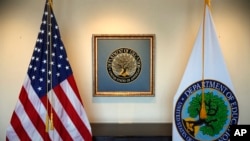
A federal judge in Texas has blocked a regulatory provision targeting for-profit colleges that was scheduled to take effect in July 2024.
Times Higher Education reports that the rule, which would affect student loans, was challenged by for-profit institutions. (June 2024)







